‘Downton Abbey: A New Era’ Stars Kevin Doyle and Raquel Cassidy Discuss Fame, Their On-Screen Romance and Shooting Aboard the Royal Yacht Britannia

Raquel Cassidy and Kevin Doyle attend the world première of 'Downton Abbey: A New Era' at Cineworld Leicester Square, London, April 25, 2022. The two stars sat down with 'Zoomer' to discuss the film ahead of its Canadian opening on May 20. Photo: Gareth Cattermole/Getty Images for Focus Features, Universal Pictures and Carnival Films
Downton Abbey: A New Era, the second and much-anticipated cinematic outing of the beloved period drama that ended in 2016, arrives in theatres May 20. Filmed last summer in the United Kingdom and France, it’s both as affecting and as escapist as devotees of the upstairs/downstairs saga have come to expect.
That you can see plot twists coming from down the corridor does little to diminish Downton’s well-upholstered pleasures, if you like that sort of thing. Those who do may rest assured of the requisite set pieces and pageantry: antique cars are polished to a gleam and the discreet rustle of beads is omnipresent because, yes, the stiff upper Brit Crawley family still dress — in fringe, velvet and vintage Patou — for dinner at home and Jazz Age parties alike. Their fashions are always sumptuous, and they may well be benevolent employers, but as much as I love the combative tête-à-têtes of Dames Maggie Smith and Penelope Wilton, I generally look beyond the green baize door for compelling storylines.
Case in point: this week I sat down with Raquel Cassidy, 54, and Kevin Doyle, 62 — who play maid Miss Baxter and valet-turned-schoolteacher Mr. Molesley respectively — at a charming downtown boîte on the Toronto stop of the publicity tour to discuss the film, reuniting with the Downton cast for A New Era and the “will they or won’t they” romance surrounding their characters.
Home and Away
Picking up where the last movie left off, it’s now 1928 and to help fund a much-needed new roof, Lady Mary (Michelle Dockery) has rented the estate to a film studio to shoot there. For about half the movie, while a crew descends on the Abbey, most of the Crawley clan (along with Miss Baxter) are off on a fact-finding expedition at Villa Rocabella, the opulent Belle Epoque mansion in the hills near St. Tropez that Violet (Smith) just mysteriously inherited.
To conjure the movie’s sunny South of France location, the French-themed café of our interview is propped with sailor-striped totes and sprigs of dried lavender. But it’s willowy Cassidy who cements the effect: her wide-legged floral jumpsuit and slinky kimono jacket is a louche ensemble that wouldn’t be out of place on a Riviera terrace in the 1920s, the heyday of beach pyjamas. It’s a double-take to recognize the vivacious star from her plain alter ego (and frankly thrilling to see the actress in anything other than Baxter’s sober uniform).
The Downton duo is fresh from the movie’s Metropolitan Opera House première in New York City, where they were joined by their American counterparts like Christine Baranski, Cynthia Nixon and Donna Murphy — cast of The Gilded Age, the new HBO series from Downton creator Julian Fellowes. It must have been a perfect opportunity to compare what it’s like to work in his period pieces across the pond. “I did speak to Michael Cerveris,” Doyle says with a chuckle. “He plays a downstairs character [Watson, George Russell’s valet] so we swapped notes a little bit about that.”
He plans to but hasn’t yet watched the 19th century-set series, an era he finds fascinating.
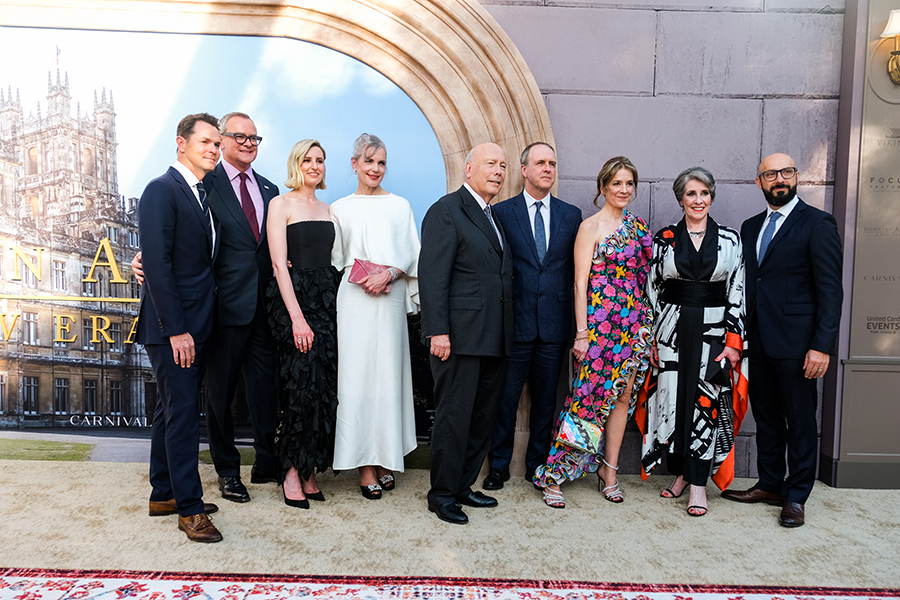
The Fame Game
Doyle and Cassidy already had established careers when the enormous success of Downton Abbey brought them to a whole other level of international mainstream recognition. And so, I wonder if they have a different appreciation for the fame arriving at that stage rather than, say, when they were in their 20s (like former Downton actor Lily James). “It’s more that I put myself into the shoes of somebody like Laura Carmichael [who plays Lady Edith Crawley], whose first job was Downton Abbey and I can’t imagine what that must be like,” Doyle says, “because I doubt she’ll ever have anything quite like this again — it’s kind of unprecedented.”
“But also, she’ll never know any different,” Cassidy counters, “not having known anything else and then suddenly you’re so recognizable and so iconic — making a career after that and from that.”
There’s something very particular about the reach of Downton Abbey, Doyle suggests, when “even Maggie Smith said she could happily walk around her local supermarket and not be bothered before it came along. And she’s already got multiple Oscars. And then suddenly —“
“It ruined her life!” Cassidy jokingly interjects.
“But I think it was different for us — well it certainly was for me,” Doyle continues. It’s been a great ride that both agree has opened doors. (Cassidy recently joined the cast of the ongoing The Good Karma Hospital medical drama in its fourth season, for example.)
“I think particularly for you,” she adds of fan-favourite underdog Molesley, “because your character has kind of grown and grown not only in volume [of storyline] but also in what he discovers about himself.”
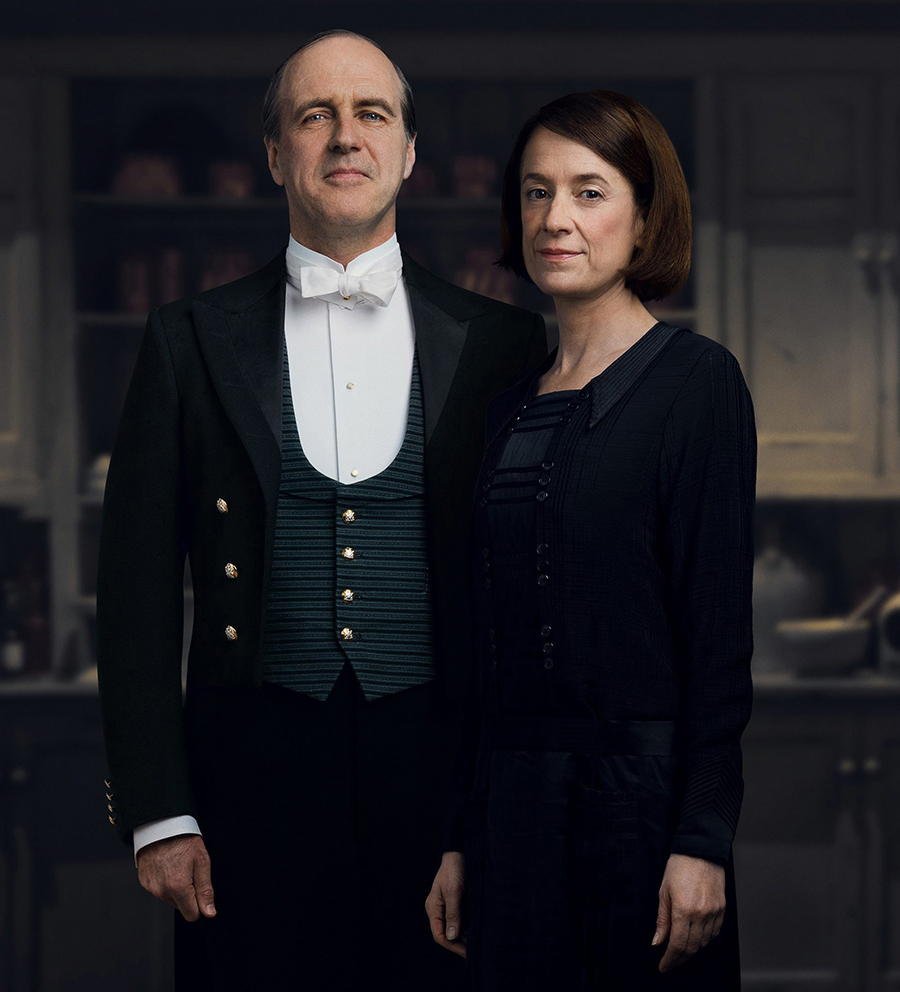
Will They or Won’t They?
As we chat it’s clear that the pair have the easy rapport of longtime scene partners and press junket pals — the former because their characters are star-crossed lovers of a sort. Downton Abbey is a true ensemble where every principal character has a fleshed-out storyline and a following, but the potential romance between their characters — teased out but left unresolved at the end of the 2019 movie — is of pressing concern to fans. The would-be relationship has inspired a significant amount of fan fiction and spawned their popular portmanteau: Baxley.
“Our characters are a man and woman of our time and are very cautious individuals,” Cassidy explains. To a modern sensibility it may seem slow but for the characters it’s a careful and respectful love — and there’s also the fact, Doyle points out, that Molesley is aware that Baxter has been hurt in the past.
“I think that one of the things that Downton — the house — does is it kind of heals the wounded,” Cassidy suggests. “We see that in Thomas Barrow very clearly but also in the characters who’ve loved and lost — Laura’s character [Lady Edith] has gone through that, Michelle’s character [Lady Mary] as well. And bringing it back to Julian,” she adds, “I think he just knew how to honour these two characters. It’s just very gentle.”
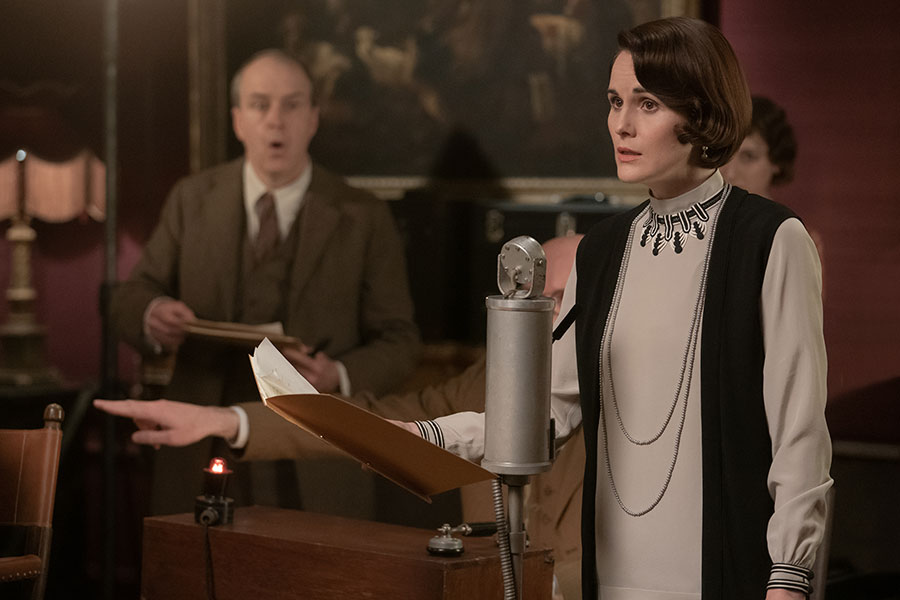
Upward Mobility
It’s not spoiling things to say that in A New Era, Doyle’s beloved and guileless Molesley rises to yet another challenge as we discover more of his veritable Swiss Army knife’s worth of talents. At this point, discussion turns to the class realities of the handsome aristocratic era depicted on screen. The way the servants were born into predetermined roles, destined to circumscribed lives with very little opportunity for social and class mobility, comes up especially in regards to assistant cook Daisy (played by actress Sophie McShera) and her tutelage by Molesley, the self-educated valet who is now the village schoolteacher.
Cassidy mentions, by way of personal example, how her own mother, born in late-1920s Spain, had a mathematical brain and wanted to study but, instead, the family sent her elder brother off to school in Madrid. “There was neither the money nor the desire to send her off” and she really had to fight to study English and eventually, move to England.
In addition to the usual friction of upstairs/downstairs class dynamics, Downton Abbey: A New Era explores the effect of modernizing forces — on the landed gentry as well as the film industry as it moves from silent to the sound era. There’s also the imposition of actors on aristocrats (“You can’t expect us to deal with cinema people” is muttered with the same disdain as Baranski saying “the new people” in The Gilded Age), a snobbery between English and French culture and, hilariously, a hierarchy between actors of the West End stage and Hollywood celebrities (“I’m not even sure it’s proper acting,” Dominic West’s dashing matinee idol character Guy Dexter cheerily declares).
With a film-within-a-film subplot about a silent movie star with the accent of a Cockney market vendor, A New Era hints at the difficulty (and stigma) that working-class actors face entering the industry compared to plummy-accented upper-class actors. It persists, in spite of icons like Tom Courtenay and Michael Caine and the barriers they broke in the 1960s (and is an issue actors like James McAvoy and Dame Judi Dench have weighed in on, called the “class ceiling”).
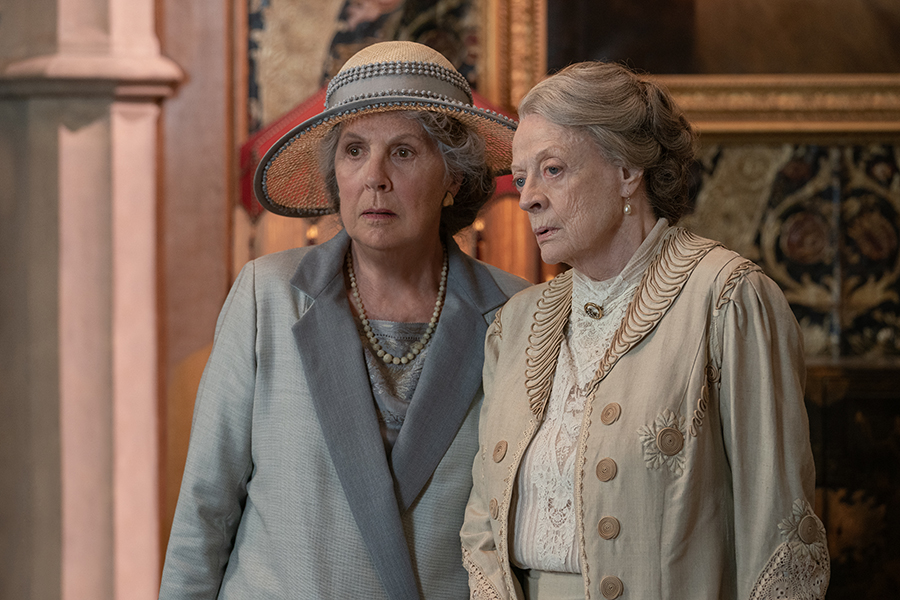
The Luxury of Time
Approaching the world of the Crawleys for the movies is a different energy than making the series, partly because the production period isn’t as long; Cassidy likens it to getting together for a party rather than for a cruise (and that includes the mood on set between takes).
“There’s also the joy — because we don’t do it every year now — of seeing one another again and getting together. It’s quite a lovely mix.” At the same time, Doyle’s appreciative that, with the movies, there’s more time to film the actual scenes, which is “a little more luxurious.”
Speaking of luxury: Villas in France are well and good, but the cast also filmed scenes of the journey to France in Edinburgh on board the decommissioned Royal Yacht Britannia, the historic sailing vessel used by the Royal Family for more than 40 years.
“When I stepped on it, it’s like a museum piece to their personal holiday and family life,” Cassidy says. “There are such beautiful family photographs everywhere — I loved that window in. Anyone can visit it and I would really recommend it, but it was a real privilege to be the first [production] to film there.”
“I’m somebody who’s just always had the monarchy and taken them for granted,” she adds, “until I met Kate Middleton.” The Duchess of Cambridge visited the set in 2015, “and when I met her I thought, wow — she’s so graceful and so good at making conversation. She was very pregnant at that point and I was impressed thinking that they really worked.”
Inside/Out at Downton
Because no cultural product can exist without an ecosystem of analysis these days, the just-launched official Downton Abbey re-watch podcast has new weekly episodes with cast interviews. “It was really interesting,” Doyle says of revisiting what effect the series had on the company of jobbing actors. “Suddenly we’re not just making a British TV show for Sunday nights; it’s having a global impact. And how weird that was! That was explored quite a lot, just sort of how it changed us personally and also in terms of our careers.”
Cassidy, who joined the series as lady’s maid to Cora Crawley (Elizabeth McGovern) partway through season 4, has a different perspective. “Because I spent three years as an ardent fan,” she laughs, “I have two very different experiences of it.”
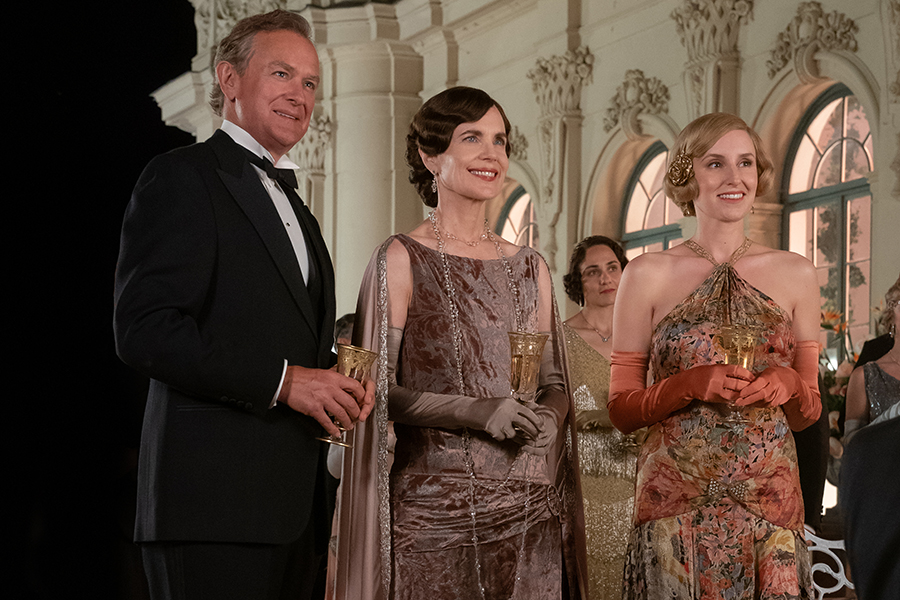
“Which is harder in a way,” Doyle says, “because you knew what you were stepping into. Whereas we didn’t, we just thought it was another job.”
“I was dead nervous on day one when I was meeting all these people who I’d completely fallen for their characters” she recalls. “Luckily, as I’ve said before, Baxter is nervous, because it’s her last chance and she’s going in [to the household] on a bit of a lie — yet if she doesn’t do that she could be destitute.” Halfway through season 5, Cassidy gleefully admits, she was still turning to co-star Joanne Froggatt in disbelief, saying “I’m in Downton Abbey!”
The End of an Era
Certain events in Downton Abbey: A New Era unfold in uncanny parallel to the zeitgeist. A rude guest, for example, is an affront to the social contract in an idealized fictional world where there’s an expectation of kindness and courtesy between staff and employer — not unlike the real-world conversations about courtesy and dignity in labour, especially with regards to respect for essential workers during the pandemic. As much as there’s the payoff of resolution, Cassidy also expects the emotional toll of personal loss and the film’s undeniable air of finality to resonate with audiences.
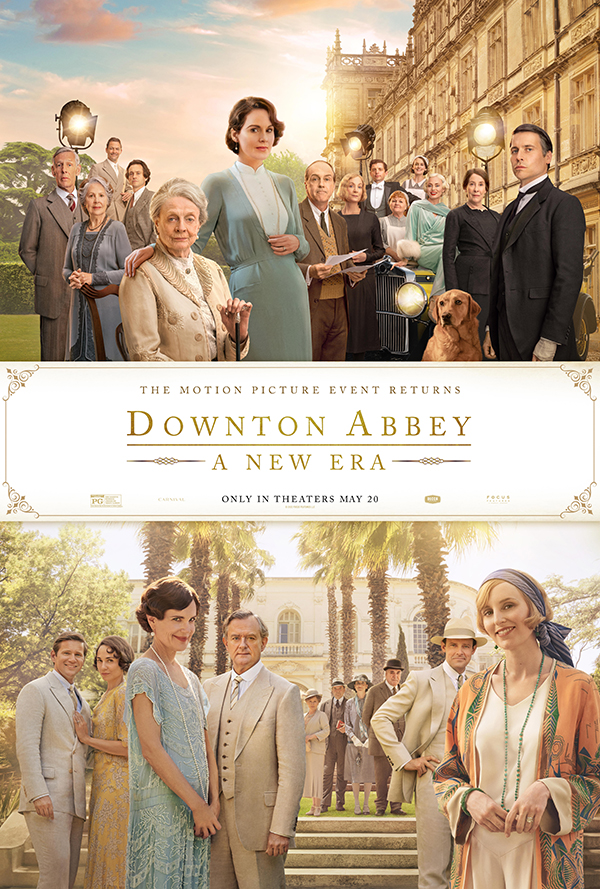
Playing Dress-Up
Along the way, however, a jubilant role-reversal setpiece in which the long-suffering servants get a taste of how the upper-half live — and dress — is as enjoyable to watch as it was to film. “First time in 12 years!” Doyle enthuses. “We did it in one day and it was just the greatest fun. There was such delight in seeing everybody who’s normally in ‘black tents’ looking so glamorous — Mrs. Patmore, Mrs. Hughes. Absolutely gorgeous!”
There was great glee and much hooting and pointing at one another (including one cast member in big artificial sideburns), with plenty of mugging in costume for personal photographs.
So if the gang did get back together for a third outing, where might they like to see their characters go next? “I would say that, having lived in the land of exquisite longing, I’d like to see Baxter challenged and rise to it again,” Cassidy says. “Or not! Or fail.”
“I’m not so sure that there will be, necessarily,” Doyle demurs. “It’ll depend on the appetite for more from the audience. But if it does finish now I think it’s a great way to end it. And in a way,” he adds, “I kind of like the idea of giving the futures of those characters over to the audience’s imagination.”
Downton Abbey: A New Era is in theatres on Friday, May 20. Click here for more information.
RELATED:
Dining Downstairs at Downton Abbey: 3 British Comfort Food Recipes
High Society: Downton Abbey’s; Julian Fellowes Returns With ‘The Gilded Age’